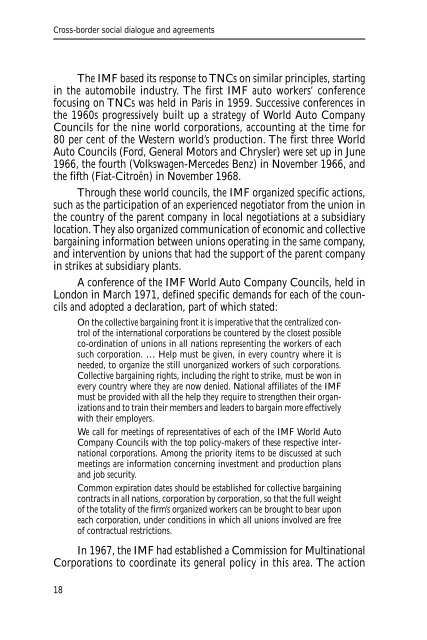CROSS-BORDER SOCIAL DIALOGUE AND AGREEMENTS: An ...
CROSS-BORDER SOCIAL DIALOGUE AND AGREEMENTS: An ...
CROSS-BORDER SOCIAL DIALOGUE AND AGREEMENTS: An ...
You also want an ePaper? Increase the reach of your titles
YUMPU automatically turns print PDFs into web optimized ePapers that Google loves.
Cross-border social dialogue and agreements<br />
The IMF based its response to TNCs on similar principles, starting<br />
in the automobile industry. The first IMF auto workers’ conference<br />
focusing on TNCs was held in Paris in 1959. Successive conferences in<br />
the 1960s progressively built up a strategy of World Auto Company<br />
Councils for the nine world corporations, accounting at the time for<br />
80 per cent of the Western world’s production. The first three World<br />
Auto Councils (Ford, General Motors and Chrysler) were set up in June<br />
1966, the fourth (Volkswagen-Mercedes Benz) in November 1966, and<br />
the fifth (Fiat-Citroën) in November 1968.<br />
Through these world councils, the IMF organized specific actions,<br />
such as the participation of an experienced negotiator from the union in<br />
the country of the parent company in local negotiations at a subsidiary<br />
location. They also organized communication of economic and collective<br />
bargaining information between unions operating in the same company,<br />
and intervention by unions that had the support of the parent company<br />
in strikes at subsidiary plants.<br />
A conference of the IMF World Auto Company Councils, held in<br />
London in March 1971, defined specific demands for each of the councils<br />
and adopted a declaration, part of which stated:<br />
On the collective bargaining front it is imperative that the centralized control<br />
of the international corporations be countered by the closest possible<br />
co-ordination of unions in all nations representing the workers of each<br />
such corporation. … Help must be given, in every country where it is<br />
needed, to organize the still unorganized workers of such corporations.<br />
Collective bargaining rights, including the right to strike, must be won in<br />
every country where they are now denied. National affiliates of the IMF<br />
must be provided with all the help they require to strengthen their organizations<br />
and to train their members and leaders to bargain more effectively<br />
with their employers.<br />
We call for meetings of representatives of each of the IMF World Auto<br />
Company Councils with the top policy-makers of these respective international<br />
corporations. Among the priority items to be discussed at such<br />
meetings are information concerning investment and production plans<br />
and job security.<br />
Common expiration dates should be established for collective bargaining<br />
contracts in all nations, corporation by corporation, so that the full weight<br />
of the totality of the firm’s organized workers can be brought to bear upon<br />
each corporation, under conditions in which all unions involved are free<br />
of contractual restrictions.<br />
In 1967, the IMF had established a Commission for Multinational<br />
Corporations to coordinate its general policy in this area. The action<br />
18
















